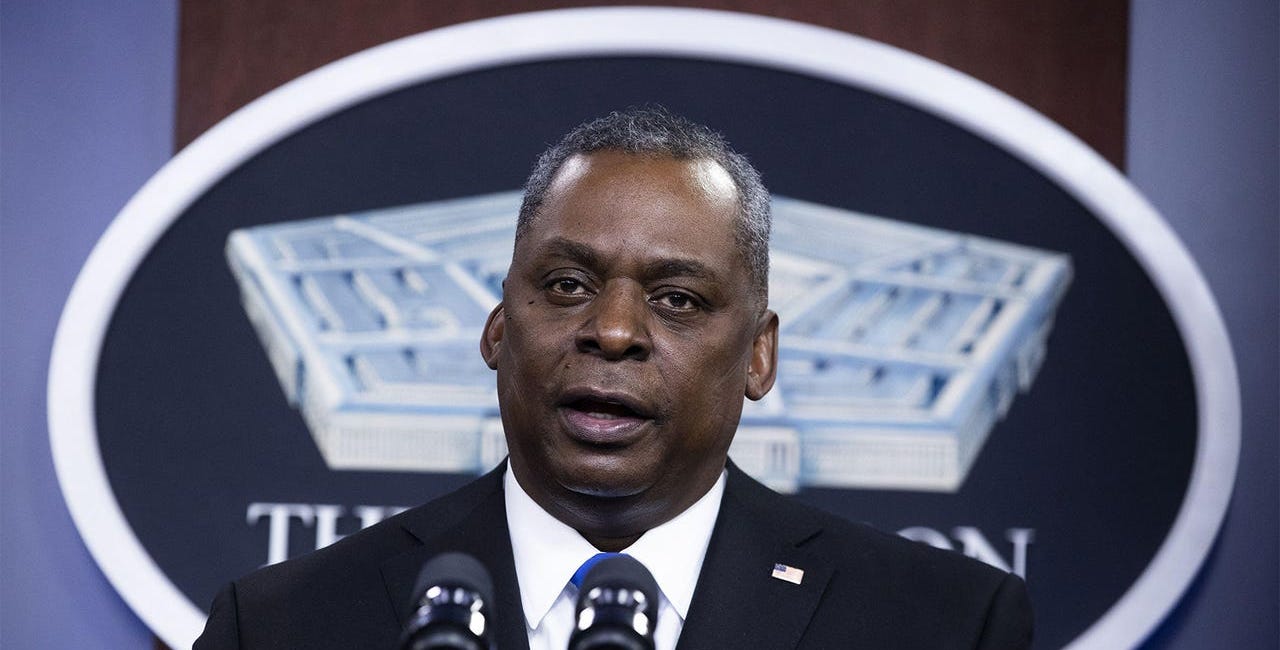PCa news story of 2024: Defense Sec.'s dual wars on terrorism and prostate cancer
Let's get on with 2025 already
(Editor’s note: I am finally saying good-bye to 2024. By Jan, 8 we are supposed to done. But one more thing: Prostate Story of 2024.
(I reviewed articles published in this blog in 2024. A few days ago, I had a contender: the unfortunate tale of one the world’s top scientists keeping the fact he was in the Active Surveillance closet before his cancer suddenly shot from a PSA 6 to a 9 and he underwent a prostatectomy. Everyone’s nightmare but a black swan event.
(Now I will recount what I consider to be the PCa story of the year: US. Defense Secretary Lloyd Austin and his unsuccessful attempt to hide his prostatectomy and related complications from President Biden, his staff, and the American public.)
By Howard Wolinsky
Elevator pitch for a Netflix series:“Operation Walnut Gland: Bombs Over PCa”: A Tom Clancy-style techno-military thriller plus a medical melodrama like “New Amsterdam”: A Defense Secretary goes rogue. He takes on the wars on terrorism and prostate cancer singlehandedly, setting up a command post in a VIP suite in a famed military hospital as he recovers from side effects from a prostatectomy. The wounded warrior, wearing a shorty hospital gown, not having notified the President of his hospitalization, dispatches drones and missiles to blow terrorists on the Red Sea out of the water. AI tools will be featured to guide his treatment with water vapor-based focal therapy as well as drones and missiles. A Congressional investigation reigns him in. Starring Denzel Washington as “The General.”
(Denzel Washington in an earlier military role.)
Sounds like fiction? But this is a rough outline of what really happened earlier this year in what was not the best moment for Secretary Austin nor prostate cancer awareness. We were treated to weeks of PCa stigmatization and shame.
U.S. Defense Secretary Lloyd Austin III had his hands full this year with the war on terrorism, the Israel-Gaza and other Middle Eastern turmoil, and the Russian invasion of Ukraine.
Then, he was diagnosed with prostate cancer, underwent a prostatectomy and ended up with a urinary tract infection from the surgery.
Austin’s Mission PCa was marked by his aide’s request for a silent ambuance run—no lights or sirens.
For a while, Austin kept his diagnosis of prostate cancer secret—as many men do—and ended up on the hot seat before a Congressional committee as GOP Congressional critics s grilled him and the DoD Inspector General investigated the spectacle.
The Washington Post sized it up nicely: “The situation was not disclosed publicly for four days and sparked controversy once it was revealed that the United States’ top defense official had undergone two hospitalizations and surgery after a prostate cancer diagnosis, but had not notified the White House or Pentagon staff.”
The then-70-year-old Austin was admitted to Walter Reed National Medical Center on Dec. 22 and underwent surgery to treat prostate cancer. He developed the infection a week later. President Biden and other senior administration officials were not told for days about his hospitalization or his cancer.
According to his doctors, the cancer was detected when Austin had a regular screening in early December 2023. They said he underwent a prostatectomy and went home the next day. But on Jan. 1, 2024, he experienced nausea and severe abdominal, hip and leg pain due to the infection.
I suspect most people would have pulled the plug on their day job and surrendered to medical care and recovery.
But Austin was driven by a soldier’s duty, or something. He’s no complainer and apparently is a Stoic.
Austin was on the job even as he was in his hospital room. He assembled a high-tech command center at Walter Reed,
AP: Austin ordered strikes from hospital where he continues to get prostate cancer care, Pentagon says
(AP Photo/Kevin Wolf)
Austin orchestrated and watched on a big screen in real-time a U.S. retaliatory strike with drones and missiles in the Red Sea on Iran-backed Houthi militants.
I have quetsions about how the Secretary dressed for this mission: Was he wearing a shorty hospital gown, struggling to be covered, while calling in hellfire? Or did he wear one of his conservative blue business suits? I think a camo robe would be too much.
Did this wounded warrior feel no one else could carry out his job? Shouldn’t he just step away from the battle and recuperate?
What was Austin thinking? We’ll probably never know—even after a presumed memoir comes out. Note to Secretary Austin: Please tell us what you were thinking.
He was criticized for waiting two days before transferring authority for DoD to his deputy, Kathleen Hicks, who was vacationing in Puerto Rico, at the time but traveled with key staff on a military plane carrying advanced communications gear. Power had been transferred to her at one point, but she was not informed that it was because Austin had been hospitalized.
(You can’t make this stuff up.)
On Feb. 26, 2024, a thinner Austin appeared before the U.S. House Armed Services Committee and did some ‘splaining of his “unannounced absence.”
(Austin testifies before the Armed Services Committee.)
The Washington Post reported: “Not even Austin’s most senior aides at the Pentagon, top officials at the White House, or Biden himself had any idea of his whereabouts and the threats to his health.”
Yikes.
Amazing that such a high-profile person can disappear and can lead an attack from his hospital room.
The Post continued: “Four days passed before Austin’s medical crisis was disclosed publicly. The uproar unleashed by the news that the Pentagon chief had undergone two hospitalizations and a surgery following a prostate cancer diagnosis without notifying the White House or Pentagon staff has threatened to overshadow his tenure leading America’s sprawling military enterprise, and created a potentially damaging distraction for Biden as he intensifies his reelection campaign.”
On Jan. 16, the Active Surveillor, leading patients advocates and a few top physicians presented the DoD chief with a petition calling on Austin to show leadership in informing other men, especially Black men like him who are hard hit by PCa, about the need to screen for prostate cancer. In a press conference when he got back on the job February, apparently responding to our requests to end the stigma and shame, Austin conceded he should have been more forthcoming about his situation to the President, the Pentagon, and the public and he talked about his responsibility to share his cancer journey with other Black men.
Open letter to Defense Secretary Lloyd Austin from the Prostate Cancer Community
(Note: U.S. Defense Secretary Lloyd Austin for weeks kept his diagnosis of prostate cancer secret—even from his boss Commander in Chief/President Joe Biden. A political and medical storm unfolded. The Pentagon Inspector General will be investigating the policy aspects. The prostate cancer community also heaped criticism on Austin for being secretive abo…
On Capitol Hill, Republicans accused Austin of endangering national security and violating notification rules. Soon, even Biden’s Democratic allies were making their objections known. Sen. Jack Reed (D-R.I.), the influential chairman of the Senate Armed Services Committee, demanded that such a lapse “never happen again.
The Austin affair triggered a debate over the proper balance between privacy and disclosure for top government officials and what rights, if any, they have in keeping serious medical problems to themselves.
The White House chief of staff ordered the Biden Cabinet to report in any serious illnesses or plans for treatment among cabinet members. Maybe Austin’s acts paid off in better policy for the American public.
***
I gave my take on DoD Secretary Austin and his prostate misadventures here in MedPageToday and in the Vox podcast:
If you attended ”AS 2025: Year In Review,” please help me out and answer this survey: https://forms.gle/dxZVdLEGSNvX7RDQ8
MRI-invisible lesions: A good sign—like a Gleason 6?
By Howard Wolinsky
Did you know that it’s possible for prostate cancer can spotted by a pathologist but the lesion can be invisible in an MRI?
Is this a good thing? Many researchers think it is a good thing.
Dr, Mark Emberton, Professor of interventional oncology at University College London and Dean of its Faculty of Medical Sciences, will be speaking to the ASPI webinar on Saturday, January 25, 2025, from noon – 1:30 p.m. Eastern (5:00pm-6:30pm UK time), about MRI-invisible lesions. Emberton is a pioneer on the use of MRIs in diagnosing, classifying and monitoring prostate cancer.
Don’t be invisible. Register here: https://zoom.us/meeting/register/tJYldu-qqzojGNEzCkgPQuTOWYGhcL80Dhec'
MRI-invisible lesionms are considered a good thing comparable to Gleason 6.
(Are you having an MRI-invisible lesion adventure. Let me know.)
Professor Emberton’s clinical research is aimed at improving the diagnostic and risk stratification tools and treatment strategies for prostate cancer (PCa). He specializes in the implementation of new imaging techniques, nanotechnologies, bio-engineering materials and non-invasive treatment approaches, such as high intensity focused ultrasound and photo-dynamic therapy.
His research has been published in over 300 peer-reviewed scientific papers in journals including BMJ, Lancet Oncology and European Urology. He has also contributed to the development of guidelines for the management of PCa and lower urinary tract symptoms, published by the International Society of Geriatric Oncology and the European Association of Urology.
If you have questions, please send them to: contactus@aspatients.org
(Prof. Mark Emberton)









